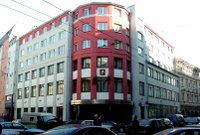Driving past the Moscow mayor's office at night in the early 1990s, lights were always on in Mayor Popov's office. During the turbulent times back in 1991-92, this was meant as a sign to Muscovites that at least someone struggled to get things back on course. As usual, the paradox of doing the impossible merely resulted in a plethora of Popov anecdotes. Now, lights have gone out for his successor, Yuri Luzhkov, and as a conflict unveils before the eyes of an amazed public, interpretations of it as part of a general Russian power struggle for the 2012 presidential elections risk becoming anecdotical. To avoid this, my advice is simple: Follow the money!
That Luzhkov's position was precarious has been evident since this summer's wild fires covering the Russian capital in smoke for weeks. Still, one should not forget that his dismissal has been longer in the making than most would care to remember. The struggle between Russia's two capitals, Muscovites and Pitertsy, is a major theme in Russian politics, that also Putin's road to power is part of. As a protegé of erstwhile St. Petersburg mayor, Anatoly Sobchak, Putin is likely never to forget how instrumental Muscovite interests were for defeating Sobchak back in 1996, and the dire consequences this had for himself. Ever since, the Pitertsy have been longing to get back at Luzhkov, barely succeeding to keep him at bay in the 2000 presidential elections that brought Putin to the Kremlin. Of course, this is common knowledge for anyone following Russia. What is interesting is how little this has been the focus of attention recently. Instead, Luzhkov's dismissal is predominantly interpreted as part of a struggle between Medvedev and Putin for the 2012 presidential elections.
Of course, as Gazprom-owned TV-channel NTV led the campaign against Luzhkov, it is easy to draw the conclusion that Medvedev, still retaining power over Gazprom, pushed the button, which is likely also the case. Does this mean that Putin was against ousting Luzhkov, as part of some ongoing duel between himself and Medvedev? Well, there is reason for skepticism to such arguments, even though they currently seem at sway. As much as there are contrasting interests between Putin and Medvedev - as in any dual power system - one should be careful when it comes to explaining everything in such terms. Still, the temptation is great for any Kremlinologist to jump at too far-reaching conclusions when centres of power engage into open battle. Simply following the political trail may however prove a sidetrack.
Instead of zooming in on who will succeed Luzhkov as Moscow mayor - a relevant question in itself - now any Russia watcher may - in real time - be able to cover a greater field in charting power relations in the country than might be deduced merely from the political game. Those who remember the Khodorkovsky case and the Yukos scandal back in 2003 are likely to recognize a recurrent pattern. As back then, Putin stands aside, some mediator - this time Sechin - carries on deceptive negotiations on how to settle a conflict of interests, while the possy prepares to move in for the kill. So, as was the case with Yukos, the interesting issue is who will divide the spoils after Luzhkov - or rather what will happen to his wife's business empire. As illustrated by the NTV-documentary, it is not only Luzhkov one is going after, but also his financial basis.
Needless to point out, there is a reason why Luzhkov's wife, Yelena Baturina, ranks eight in Russian riches. The politico-financial symbiosis between the mayor and his wife in the capital's building and construction business is a racket that has sky-rocketed Moscow real estate prices to some of the highest in the world. With all adjoining businesses under the former mayor's influence, living costs have reached ridiculous levels for most Muscovites. Still, this is the sort of daily corruption that no one cares to bother with, regarding it merely as a way of life. The question now is if Luzhkov has reached a settlement e.g. with Sechin, giving him some sort of immunity in an ordered exchange for his wife's business empire, or if we will witness something similar to what happened to Yukos.
The point is that regardless of struggle or settlement over the Luzhkov spoils, following the money may shed much more light on how forces arrange themselves for the future than merely regarding it as a traditional Kremlinologist game. So, it may be worthwile to pay attention to who goes in for the kill on Luzhkov's legacy - whether in person or by proxy. As lights go out for Luzhkov, lights on his legacy should be kept on for anyone wanting to decipher the machinations of Russian politics.





